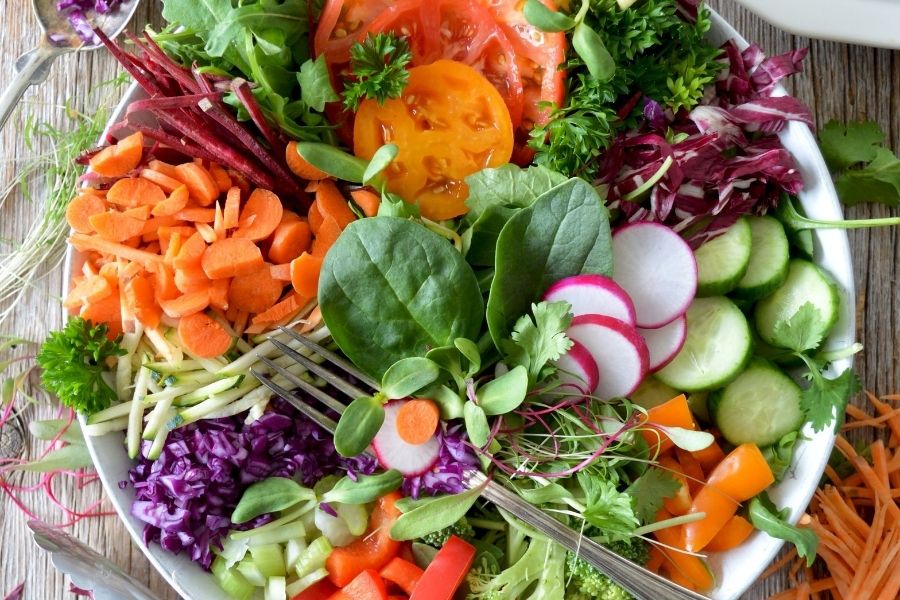You may have heard of Ayurveda or maybe you have yet to, but it has many great components that benefit health. So let’s dive into what it is and can do for you.
The Ayurvedic diet is an ancient diet based around the principles of Ayurvedic medicine, which originates from the Indian and Nepalese regions. It has been around for thousands of years and has varied and evolved over this time.
Despite its longevity, it has recently gained a lot of traction and popularity since the outbreak of COVID-19. People have been locked indoors and are more aware of their health than ever before so they’ve been drawn to Ayurveda for t its natural immune-boosting elements.
This diet focuses on adding or substituting foods and ingredients depending on your body type – which we’ll get into in a moment and encourages eating whole foods and lifestyle practices to bring the body into balance. And it’s even said to promote weight loss and support mindfulness.
It centers around and encourages whole-body healing, which includes physical, mental, and emotional health by incorporating yoga, meditation and massage into practical lifestyle recommendations.
Are you curious about what Ayurveda has to say about different body types and maybe get a glimpse into identifying yours? Read on :).
The Three-Body Types
A major part of following this diet focuses around three main body types, or ‘Doshas’ as they are referred to in Ayurveda
Each body type has a name and personality and depending on what type you are will depend on the types of foods you should eat or avoid. Who would ever have known that there’s so much customization in Ayurveda? This is one of many reasons why we love the philosophy so much.
In line with Ayurveda, five elements make up the universe — Vayu (air), Jala (water), Akash (space), Teja (fire), and Prithvi (earth) and each of the body types incorporate one or more of these elements. As each of these elements is described you can see how they may relate to you.
- Pitta (fire + water) – is the transformer, high achiever and goal setter. This body type generally has a medium physical build, short temper, and may suffer from conditions like indigestion, heart disease, or high blood pressure when out of balance.
- Vata – (air + space). Creative, energetic, and lively. People with this dosha are usually thin with a light frame and may struggle with digestive issues, fatigue, or anxiety when out of balance.
- Kapha – (earth + water). Naturally calm, grounded, and loyal. Those with a Kapha dosha often have a broader frame and may have issues with weight gain, asthma, depression, or diabetes when out of balance.
If you are interested in finding out what your Dosha (body type) is, check out my FREE quiz
How does Ayurveda support immunity?
According to Ayurveda, strong immunity is a product of good digestion, strong metabolism (called agni in Sanskrit) quality liver functioning and balanced hormones. Immunity is also very much connected to a substance called Ojas which literally means “vigor”. In the body, Ojas is extremely subtle and elusive Simply put, Ojas are the containers of a body’s and mind’s energy, it’s the essence we gather from the food we take in.
In keeping with Ayurveda, factors that either build our immunity or cause it to decline are:
- Our unique Prakruti (natural body constitution), this is also associated with which Dosha you have.
- Health of Ojas
- Your digestive power
- Balance or equilibrium of the Doshas within us
- Your State of Mind or Mansika Doshas
A lot of the immunity-boosting qualities come from a person’s diet and being mindful of what your body is consuming, both physically as well as mentally – which helps us remember the things that can easily be forgotten in our busy lives.
Depending on your Dosha you will be more susceptible to different illnesses or conditions but knowledge of this amazing science can help greatly with prevention.
For example, here’s a great immunity go-to recipe that you can incorporate in your daily life:
Ojas Drink

Ingredients:
3 glasses of water
Pomegranate Peel- 1 whole
Fresh Ginger- 1 Inch
Fresh Turmeric- 1 inch
Fresh Basil leaves/Tusli- 10 leaves
Guduchi Powder- 1 Tsp
Directions:
Stir it well, boil it for 5-10 minutes. Strain out the ingredients and let it cool down. Add 1 tsp of honey, mix well and drink throughout the day.
Aside from natural home remedies, it’s important to practice yoga or do any kind of physical activity to help stay fit and healthy. Following these simple tips of Ayurveda will definitely help in maintaining health even in these tough times!
Common Misconceptions
You can’t eat animal protein.
While Ayurveda encourages a vegetarian diet due to its immense health benefits, it’s never restricted to being just vegetarian. Vegetarian meals are often easier on our digestive system and can provide all nutrients if planned right but consumption of animal protein isn’t prohibited in Ayurveda. It’s based on each individual’s food preferences whether they follow a vegan, vegetarian, pescatarian or plant-based diet that incorporates animal products. However, if you like to eat meat, it’s important to choose the right animal protein foods based on your Dosha.
You can’t drink coffee or eat chocolate.
Chocolate, like coffee and tea, is loaded with powerful phytochemicals and antioxidants that deliver numerous health benefits. The Ayurvedic diet is all about having a balanced intake of a range of foods and while these are still allowed it’s recommended that they be consumed in moderation especially if they cause your Dosha to get out of balance.
It sounds like a lot of work to follow
Like many lifestyle changes, it takes a bit of getting used to. But once you know your dosha, have a good awareness of the best foods for your body type and incorporate meal planning into your everyday routine this becomes a lot easier!
Here’s a recipe to a great recipe that can get you started with meal planning, and is easily adaptable for any body type.






